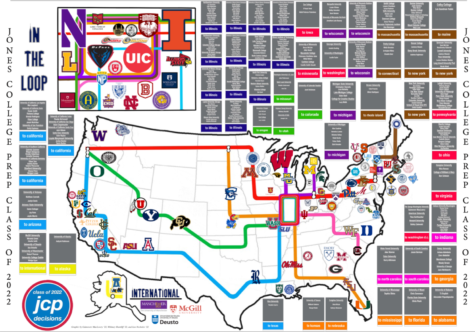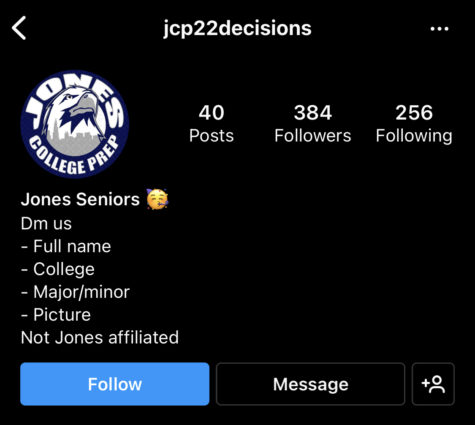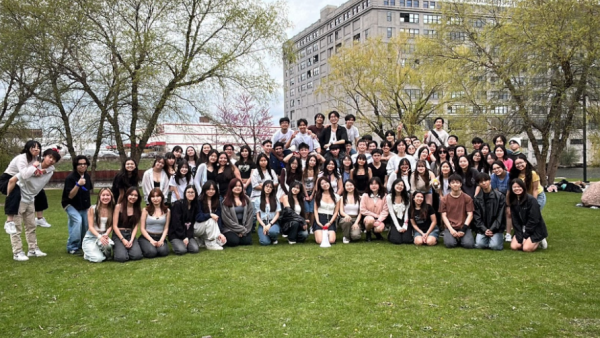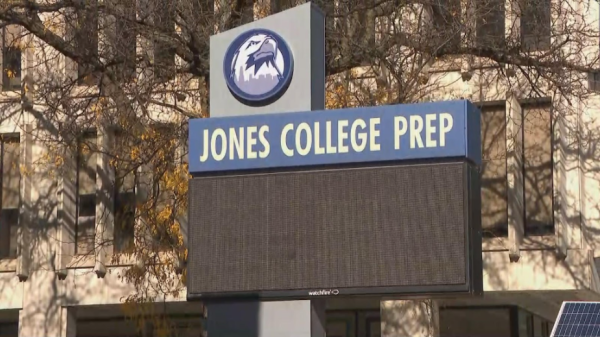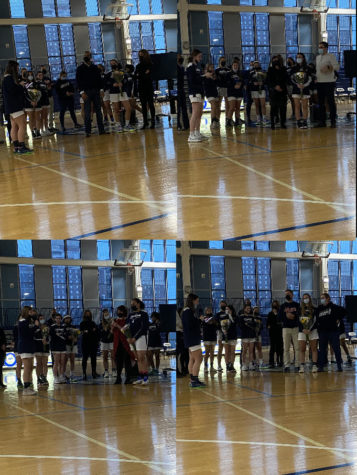Jones LSC welcomes new members
Issues of equity and COVID-19 safety covered at Jan. 11 meeting
The Jones Local School Council welcomed two new student representatives at their most recent meeting on Jan 11.
The new LSC members, William Clancy ‘22 and Alex Kerr ‘23, are excited to represent Jones students, who they say are often not given a voice in discussions about school policy.
“We are the largest part of the Jones ecosystem, but we’re frequently underrepresented when decisions are made,” said Clancy. “I’m hoping to provide more opportunities for students to get involved with the LSC.”
The meeting focused on how Jones administration could enforce COVID-19 precautions to keep students and staff safe amid rising positivity rates.
“We’ll be reminding the students first thing tomorrow morning, urging faculty and staff members, especially when kids are in the classroom, to keep an eye out for students who are not complying,” said Jones Principal Dr. Paul Joseph Powers.
Some complained that simply asking students to comply with the mask mandate wasn’t effective and put too much pressure on teachers.
“It’s been really difficult as a teacher to enforce appropriate mask-wearing, one time a student even cussed at me when I politely asked him to pull up his mask,” said English teacher Caitlyn Miller. “This is unacceptable. No one really wants to wear a mask, but we have to. Students, teachers, admin, and parents all need to work together to support this expectation.”
In order to show support for greater COVID-19 precautions at Jones, the LSC passed a COVID-19 mitigation letter calling for great mask accessibility, an opt-out testing system, and a remote learning option for some students and teachers, among other safety measures.
“I see no reason why we as an LSC have to go by whatever deal may be struck between the Teacher’s Union and CPS,” said LSC member Deborah Land. “Going on record and saying that we support more aggressive mitigation to protect our teachers, students, and staff is very important for us as a council.”
However, the shared concern for the safety of Jones students and staff did not insulate the meeting from conflict between LSC members and Jones administration. The meeting began with a statement from Jones Business Manager Jeremy Voigt about why he has chosen to leave Jones for a position at another school.
“In recent months it feels as though there has been increasing division within our parent group, as well as our staff at Jones,” said Voigt. “I have explained my reasons for leaving Jones, but I also will not pretend that this division, especially among the support staff and teachers, has not contributed to my decision.”
The division within the LSC was exemplified by an argument surrounding the purchase of a new batting cage for the boy’s baseball and girl’s softball teams.
Some members were concerned that the batting cage being financed by the baseball team was a sign of wider inequality between boys and girls sports at Jones. Others felt that this argument was counterproductive in actually addressing students’ needs.
“I don’t want to speak out of turn, but I don’t understand the controversy in this situation,” said Clancy. “I understand that there are concerns about the equity between the baseball and softball teams but that seems like it’s perhaps a separate issue that this council should look into at a later time, rather than further delaying the purchase.”
The LSC also discussed the possibility of replacing textbooks for AP U.S. History classes. Some claimed the outdated and alleged insensitive content made the textbooks incongruous with Jones’ commitment to racial equity.
“When you ask ‘why don’t students want to take our AP U.S. History classes, a lot of that has to be the textbook, even if you’re only selecting certain things,” said Land. “A lot of what we’ve heard is that it’s horribly unmotivating for students of color to have to deal with misinformation in their class.”
Some students actually thought the current textbook was actually beneficial when used in addition to other texts.
“With American Pageant, I think it’s important to recognize how it’s used. In the curriculum, we didn’t use it all the time, a lot of the time we did text by text comparisons to understand the misinformation within American Pageant,” said Kerr. “I think an important lesson to learn is that sometimes the text is incorrect and insensitive.”
Though there was no resolution to the textbook discussion, the LSC did decide to pass a new dress code to resolve conflict from the beginning of the school year.
Many students felt intercom announcements at the beginning of the year about the appropriateness of some students’ outfits were vague and unfairly targeted female and gender non-conforming students.
“Despite any neutral intentions of offering a pure reminder, the impact was one of hurt. It seemed that there were some common issues around the dress code that left it very ambiguous,” said LSC member Roberto Menjivar, who helped write the new dress code. “Students felt that it was up to a small group of individuals to decide what is appropriate and what isn’t appropriate.”
The LSC Equity Committee used the National Organization for Women’s dress code model, as well as examples from several schools in and outside of CPS, to create the new dress code. Preliminary student opinions were also positive.
“These are guidelines, there are just to help us frame things a little bit better,” said Menjivar. “As long as we trust Jones students, we should be able to turn our concerns to more important things.”

